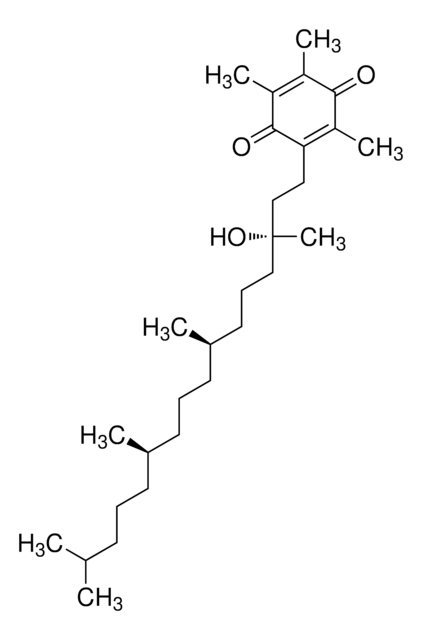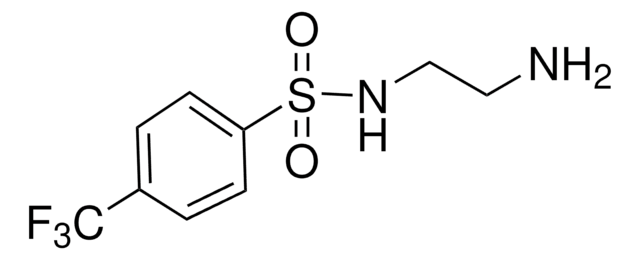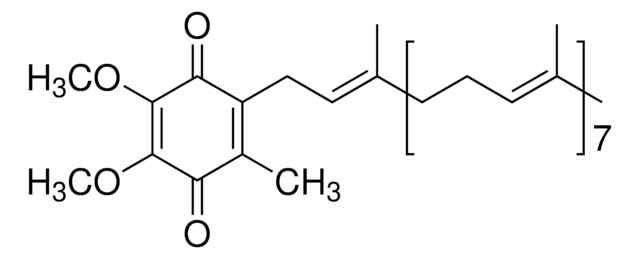C9504
Coenzyme Q6
Synonym(s):
2,3-Dimethoxy-5-methyl-6-(farnesylfarnesyl)-1,4-benzoquinone, Ubiquinone-30
Sign Into View Organizational & Contract Pricing
All Photos(1)
About This Item
Empirical Formula (Hill Notation):
C39H58O4
CAS Number:
Molecular Weight:
590.88
MDL number:
UNSPSC Code:
12352204
PubChem Substance ID:
Recommended Products
biological source
Saccharomyces cerevisiae
storage temp.
−20°C
SMILES string
COC1=C(OC)C(=O)C(C\C=C(/C)CC\C=C(/C)CC\C=C(/C)CC\C=C(/C)CC\C=C(/C)CC\C=C(\C)C)=C(C)C1=O
Packaging
Sealed ampule.
Storage Class Code
10 - Combustible liquids
WGK
WGK 3
Flash Point(F)
Not applicable
Flash Point(C)
Not applicable
Personal Protective Equipment
dust mask type N95 (US), Eyeshields, Gloves
Certificates of Analysis (COA)
Search for Certificates of Analysis (COA) by entering the products Lot/Batch Number. Lot and Batch Numbers can be found on a product’s label following the words ‘Lot’ or ‘Batch’.
Already Own This Product?
Find documentation for the products that you have recently purchased in the Document Library.
Alejandro Martín-Montalvo et al.
The Biochemical journal, 440(1), 107-114 (2011-08-05)
CoQ(6) (coenzyme Q(6)) biosynthesis in yeast is a well-regulated process that requires the final conversion of the late intermediate DMQ(6) (demethoxy-CoQ(6)) into CoQ(6) in order to support respiratory metabolism in yeast. The gene CAT5/COQ7 encodes the Cat5/Coq7 protein that catalyses
Peter Gin et al.
The Journal of biological chemistry, 278(28), 25308-25316 (2003-05-02)
Coenzyme Q (Q) is a lipid that functions as an electron carrier in the mitochondrial respiratory chain in eukaryotes. There are eight complementation groups of Q-deficient Saccharomyces cerevisiae mutants, designated coq1-coq8. Here we have isolated the COQ6 gene by functional
C J Sippel et al.
The Journal of biological chemistry, 258(2), 1057-1061 (1983-01-25)
Increasing concentrations of glucose (1-5%) in the growth medium depressed ubiquinone-6 biosynthesis in continuously cultured wild type Saccharomyces cerevisiae. In addition, an early intermediate in the pathway of ubiquinone-6 biosynthesis, i.e. 3,4-dihydroxy-5-hexaprenylbenzoate (3,4-DHHB), was found to accumulate. The increase in
S Padilla et al.
Cellular and molecular life sciences : CMLS, 66(1), 173-186 (2008-11-13)
Coenzyme Q is a lipid molecule required for respiration and antioxidant protection. Q biosynthesis in Saccharomyces cerevisiae requires nine proteins (Coq1p-Coq9p). We demonstrate in this study that Q levels are modulated during growth by its conversion from demethoxy-Q (DMQ), a
R R Goewert et al.
Biochemistry, 20(14), 4217-4223 (1981-07-07)
The mutant strain of Saccharomyces cerevisiae E3-24 is unable to synthesize ubiquinone-6. When this mutant is grown in the presence of p-hydroxy[U-14C]benzoate or p-hydroxy[carboxy-14C]benzoate, a radioactive compound accumulates. This new metabolite has been isolated and identified as 3,4-dihydroxy-5-hexaprenylbenzoate (3,4-DHHB). Aerobically
Our team of scientists has experience in all areas of research including Life Science, Material Science, Chemical Synthesis, Chromatography, Analytical and many others.
Contact Technical Service








